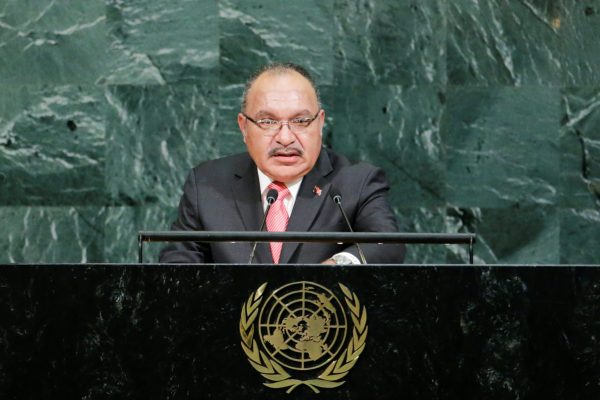Then in March 2017, then treasurer and National Alliance party leader Patrick Pruaitch strongly condemned the government’s economic management and accused O’Neill of being ‘a micro-manager of all ministries’. He was promptly dropped from the cabinet.
The election itself was held over four weeks in June–July. Some 3324 candidates contested the 111 seats. 45 political parties were registered prior to the election, but (as usual) the majority of candidates stood as independents and all candidates appealed primarily to local loyalties and parochial issues.
As in other recent elections, there were widespread complaints of electoral irregularities. A number of people were denied a vote because their names were not on the roll and in some electorates votes cast exceeded estimates of eligible voters. There were also reports of vote buying, bloc voting and coercion of voters, especially in the volatile highland provinces where more than 20 people are said to have died in election-related incidents.
An electoral monitoring team suggested that the problems encountered in 2017 were even greater than those reported in the two previous elections. A Commonwealth observer team called for a thorough review of all aspects of the election process immediately after the election. Electoral Commissioner Patilias Gamato nonetheless described the election as ‘successful’ and ‘generally peaceful’, while Australia’s Foreign Minister Julie Bishop praised PNG for its ‘successful election’.
Writs were scheduled to be returned by 24 July but with only 80 seats declared by then the date was extended to 28 July. There were suggestions that in some seats where O’Neill’s People’s National Congress (PNC) appeared to be losing, declarations had been deliberately delayed in order to ensure that the PNC had the largest number of elected members of parliament (MPs) and so would be invited to form government when the Parliament met.
Several prominent members of the previous O’Neill government lost their seats in the election and PNC numbers were well below what they were at the end of the last parliament. Former opposition leader Don Polye (who had been minister for finance before falling out with O’Neill) also lost his seat but two opposition parties — Pangu Pati and the National Alliance — increased their parliamentary membership.
167 women ran in PNG’s election but despite various efforts to support women in politics not even the three women in the last parliament held their seats. The legislature is now without a female MP.
In late July party leaders began to build coalitions. O’Neill and his PNC MPs set up camp in the city of Alotau and were joined by the People’s Progress Party, the Social Democratic Party and the United Resources Party. The National Alliance (which was established by former prime minister Sir Michael Somare and was part of the O’Neill coalition government from 2012–17) and a revived Pangu Pati camp met in the city of Kokopo. Some other minor parties had MPs in both camps.
Fewer independents were returned in 2017 than in other recent elections. Both camps sought to hold their parties together and to recruit the independents — with the usual claims of attempts to bribe or kidnap some of them.
Both groups claimed to have the numbers, but it was the Alotau group that came out on top. As leader of the party with the most endorsed MPs, O’Neill was invited to form government. On 2 August he was re-elected as prime minister by 60 votes to 46.
For a while it looked as though O’Neill would be faced with a significantly stronger opposition in the new parliament, but in September former opposition leader Sam Basil and the majority of his Pangu members decided to join the O’Neill-led coalition.
Shortly after the O’Neill government took office it was reported that PNG’s National Court had lifted the stay order on the arrest warrant against the Prime Minister, thus clearing the way for his arrest. O’Neill’s lawyers then lodged yet another appeal, which has further postponed a resolution of the charges against him.
The closure of the Manus Refugee Processing Centre, which was mandated by the PNG Supreme Court, continued to plague both the PNG and Australian governments during the year. The remaining refugees have resisted a proposed resettlement in Manus and the Australian government has opposed New Zealand’s offer to accept 150 refugees, which leaves O’Neill with a continuing problem to carry into 2018.
O’Neill will continue to prepare for the APEC Leaders’ Summit meeting in Port Moresby in 2018. He has managed to stay afloat, but the corruption allegations and a persistent opposition remain robust and will follow the coalition government through 2018.
Ronald May is an Emeritus Fellow in the College of Asia and the Pacific at The Australian National University.
This article is part of an EAF special feature series on 2017 in review and the year ahead.

